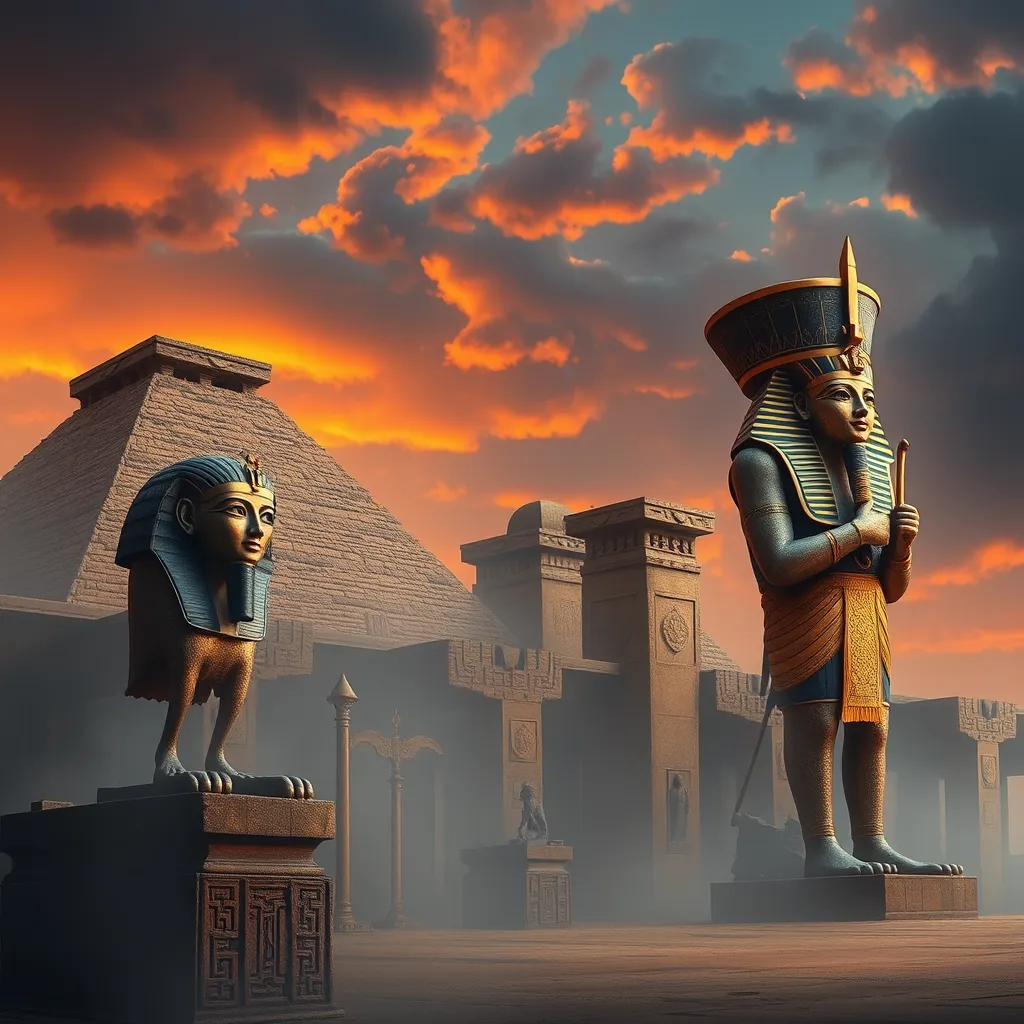The Legacy of Ancient Egypt: The Impact of Its Myths and Legends on the Modern World
I. Introduction
Ancient Egypt, one of the world’s earliest and most influential civilizations, thrived along the banks of the Nile River for thousands of years. Known for its remarkable achievements in architecture, writing, art, and governance, Egypt also established a rich tradition of myths and legends that played a crucial role in shaping its culture. These stories, steeped in symbolism and moral lessons, provided explanations for natural phenomena, defined cultural values, and guided the spiritual practices of the ancient Egyptians. This article explores how these enduring narratives continue to influence various aspects of contemporary society, from literature and art to spirituality and popular culture.
II. The Rich Tapestry of Egyptian Myths and Legends
The mythology of Ancient Egypt is a complex web of stories featuring a diverse pantheon of deities, each embodying different aspects of life and death. Key figures include:
- Osiris: The god of the afterlife, resurrection, and agriculture, whose story revolves around themes of death and rebirth.
- Isis: The goddess of magic, motherhood, and fertility, known for her compassion and protective nature.
- Ra: The sun god, symbolizing creation and the cycle of life.
These deities were central to Egyptian beliefs about creation, death, and the afterlife. Myths often depicted the journey of souls through the underworld, emphasizing the importance of moral conduct during life to achieve a favorable judgment after death.
Moreover, mythology served practical purposes within the society. It influenced governance, as pharaohs were often regarded as divine representatives of gods, legitimizing their authority and establishing a connection between the divine and the earthly realm.
III. Ancient Egypt’s Influence on Literature and Art
The rich narratives from Egyptian mythology have had a profound impact on literature throughout history. Classical writers such as Homer and Ovid drew inspiration from these myths, weaving them into their own epic tales. For instance, the story of Osiris’s resurrection can be seen reflected in various cultural narratives that explore themes of death and renewal.
In modern media, Egyptian myths continue to inspire artists and creators. Notable examples include:
- Films like “The Mummy” and “Gods of Egypt,” which depict ancient legends with a contemporary twist.
- Literature such as Rick Riordan’s “The Kane Chronicles,” which blends Egyptian mythology with modern storytelling.
Symbolism derived from these myths is frequently employed in artistic representations, serving to evoke deeper meanings and cultural connections in contemporary works.
IV. Religious and Spiritual Resonances
The spiritual beliefs of Ancient Egypt have resonated through the ages, influencing modern spiritual practices. Many contemporary spiritual movements draw upon Egyptian deities and rituals, reflecting a renewed interest in ancient wisdom. For example, practices such as meditation and rituals invoking Isis for healing and protection are revived in modern spiritual circles.
When comparing Egyptian mythology to other religious traditions, similarities emerge that highlight universal themes:
- The concept of an afterlife, present in Christianity and Islam, parallels the Egyptian beliefs surrounding the journey of the soul.
- Creation myths in various cultures, including Hinduism and Greek mythology, share elements with the Egyptian creation stories involving gods like Ra and Atum.
This intersection of beliefs showcases the broader human quest for understanding existence and the divine.
V. The Role of Ancient Egypt in Popular Culture
In popular culture, Egyptian myths have captured the imagination of audiences worldwide. The portrayal of these ancient stories in movies, television series, and video games has led to a fascination with Egyptology. Some noteworthy examples include:
- Documentaries exploring the mysteries of the pyramids and the lives of pharaohs.
- Video games like “Assassin’s Creed: Origins,” which immerses players in the world of Ancient Egypt.
This enduring interest has also impacted tourism, with millions flocking to Egypt to explore its archaeological wonders. The commercialization of Egyptian themes has seeped into fashion and design, with hieroglyphics and motifs appearing in contemporary clothing and home decor.
VI. Psychological and Philosophical Insights from Egyptian Legends
Egyptian myths offer rich psychological and philosophical insights, particularly through the lens of archetypal analysis. Carl Jung’s theories highlight how these ancient stories reflect universal human experiences and emotions. Some key themes include:
- Death and Rebirth: The cyclical nature of life depicted in Osiris’s resurrection resonates with psychological concepts of transformation.
- Moral Lessons: Many myths convey ethical lessons that still hold relevance today, encouraging moral behavior and introspection.
These narratives invite exploration of identity, existence, and the human condition, allowing individuals to connect with their own experiences and the collective unconscious.
VII. Modern Adaptations and Reinterpretations of Egyptian Myths
Contemporary authors and creators are reimagining ancient Egyptian tales, infusing them with modern sensibilities and diverse cultural narratives. This fusion often results in novel interpretations that resonate with today’s audiences. For instance:
- Graphic novels and young adult fiction are incorporating Egyptian mythology to engage younger readers.
- Film adaptations have started to feature more nuanced portrayals of Egyptian characters, moving away from stereotypes.
Globalization has also influenced how these myths are interpreted, leading to diverse adaptations that reflect different cultural contexts and perspectives.
VIII. Conclusion
The legacy of Ancient Egyptian myths and legends is profound, shaping not only the civilization itself but also leaving an indelible mark on modern culture and spirituality. From literature and art to popular culture and psychological insights, these ancient narratives continue to resonate with contemporary society. Preserving and studying these stories is vital, as they offer invaluable lessons and reflections on the human experience. As we move forward, the potential for these myths to influence future cultural and spiritual developments remains ever-present, inviting new generations to engage with the enchanting world of Ancient Egypt.




